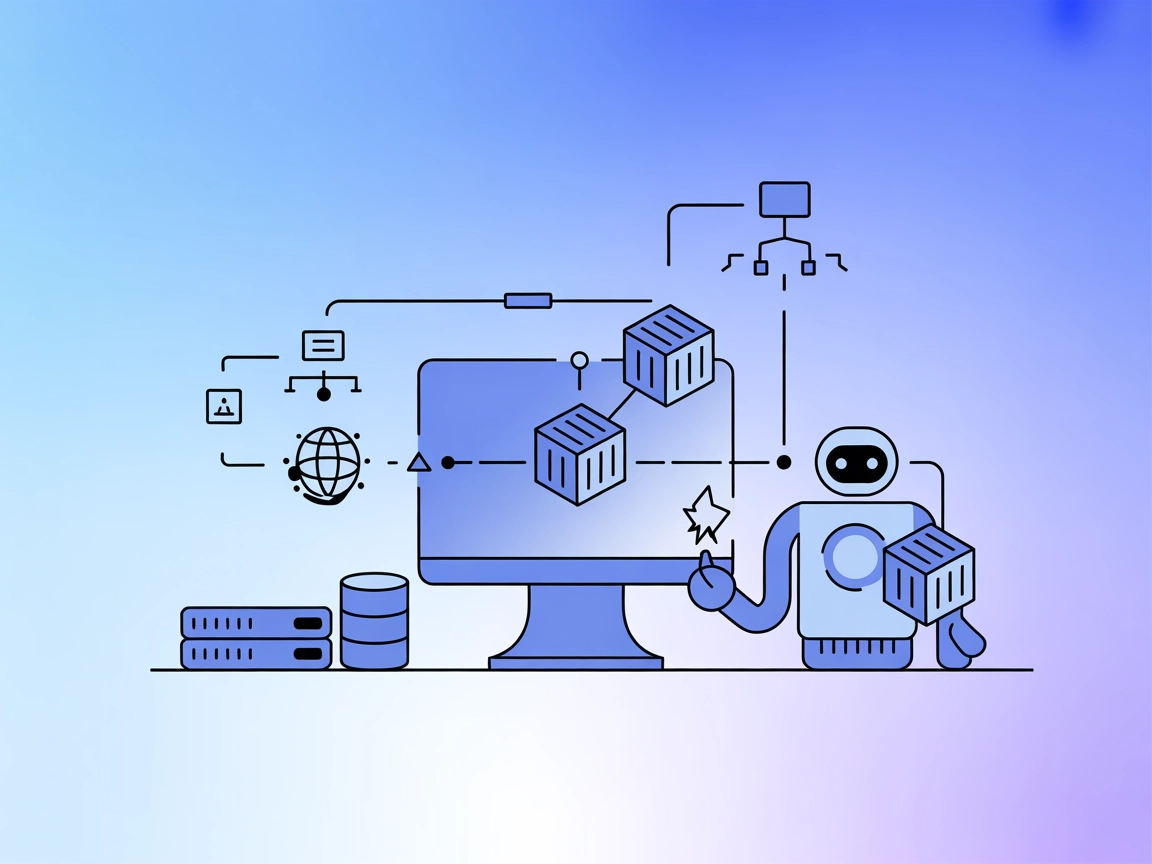
Model Context Protocol (MCP) Server
The Model Context Protocol (MCP) Server bridges AI assistants with external data sources, APIs, and services, enabling streamlined integration of complex workfl...

Empower your AI agents to orchestrate, inspect, and manage Docker containers naturally using the mcp-server-docker MCP Server.
FlowHunt provides an additional security layer between your internal systems and AI tools, giving you granular control over which tools are accessible from your MCP servers. MCP servers hosted in our infrastructure can be seamlessly integrated with FlowHunt's chatbot as well as popular AI platforms like ChatGPT, Claude, and various AI editors.
The mcp-server-docker MCP Server is a specialized Model Context Protocol (MCP) server designed to provide AI assistants with the ability to manage Docker containers seamlessly via natural language. By connecting AI agents to Docker, it enables automated container orchestration, introspection, debugging, and persistent data management, all through standardized MCP interfaces. This server empowers developers, system administrators, and AI enthusiasts to interact with Docker environments—locally or remotely—simplifying workflows such as spinning up new services, managing running containers, and handling Docker volumes. The integration of MCP with Docker enhances productivity, reduces manual intervention, and opens up new avenues for AI-driven development and operations.
mcpServers object:"mcpServers": {
"mcp-server-docker": {
"command": "uvx",
"args": [
"mcp-server-docker"
]
}
}
~/Library/Application Support/Claude/claude_desktop_config.json.%APPDATA%/Claude/claude_desktop_config.json.mcpServers section:"mcpServers": {
"mcp-server-docker": {
"command": "uvx",
"args": [
"mcp-server-docker"
]
}
}
mcpServers object:"mcpServers": {
"mcp-server-docker": {
"command": "uvx",
"args": [
"mcp-server-docker"
]
}
}
"mcpServers": {
"mcp-server-docker": {
"command": "uvx",
"args": [
"mcp-server-docker"
]
}
}
To secure API keys, use environment variables in your configuration. Example:
"mcpServers": {
"mcp-server-docker": {
"command": "uvx",
"args": [
"mcp-server-docker"
],
"env": {
"DOCKER_HOST": "${DOCKER_HOST_ENV_VAR}"
},
"inputs": {
"api_key": "${DOCKER_API_KEY_ENV_VAR}"
}
}
}
Using MCP in FlowHunt
To integrate MCP servers into your FlowHunt workflow, start by adding the MCP component to your flow and connecting it to your AI agent:

Click on the MCP component to open the configuration panel. In the system MCP configuration section, insert your MCP server details using this JSON format:
{
"mcp-server-docker": {
"transport": "streamable_http",
"url": "https://yourmcpserver.example/pathtothemcp/url"
}
}
Once configured, the AI agent is now able to use this MCP as a tool with access to all its functions and capabilities. Remember to change “mcp-server-docker” to your actual MCP server name and replace the URL with your own MCP server endpoint.
| Section | Availability | Details/Notes |
|---|---|---|
| Overview | ✅ | Description and key features found in README.md |
| List of Prompts | ✅ | docker_compose prompt described in README.md |
| List of Resources | ✅ | Containers, Volumes, Networks referenced as data types and management targets |
| List of Tools | ✅ | docker_compose, container introspection, volume management (from capabilities) |
| Securing API Keys | ✅ | Example provided for environment variable usage in config |
| Sampling Support (less important in evaluation) | ⛔ | Not mentioned in repository or documentation |
The mcp-server-docker MCP provides clear documentation, practical prompt workflows, and robust Docker integration. Its focus on natural language orchestration and introspection makes it especially valuable for developers and AI-powered operations. However, details on advanced MCP features such as Roots and Sampling are not present. Overall, it’s a mature, highly usable MCP server for Docker automation.
| Has a LICENSE | ✅ (GPL-3.0) |
|---|---|
| Has at least one tool | ✅ |
| Number of Forks | 54 |
| Number of Stars | 490 |
It is a Model Context Protocol (MCP) server that empowers AI assistants and chatbots to manage Docker containers via natural language. It enables container orchestration, debugging, and data management directly from FlowHunt or other AI tools.
The mcp-server-docker MCP exposes containers, volumes, and networks. AI clients can inspect, create, delete, and manage these resources programmatically.
Common use cases include natural language container deployment, remote server administration, container debugging and introspection, volume management, and rapid experimentation with open-source Dockerized apps.
Store sensitive data such as API keys or Docker host URLs in environment variables. The configuration examples show how to interpolate environment variables for secure access.
Add the MCP component to your flow, open its configuration panel, and insert your MCP server details in the system MCP configuration section using the provided JSON format. Update the server name and URL to match your deployment.
Streamline container orchestration, debugging, and DevOps workflows by connecting FlowHunt or your favorite AI assistant to Docker using the mcp-server-docker MCP Server.

The Model Context Protocol (MCP) Server bridges AI assistants with external data sources, APIs, and services, enabling streamlined integration of complex workfl...

The MCP Containerd server bridges Containerd's runtime with the Model Context Protocol (MCP), enabling AI agents and automation workflows to manage containers, ...

The Code Sandbox MCP Server provides a secure, containerized environment for executing code, enabling AI assistants and developer tools to run, test, and manage...
Cookie Consent
We use cookies to enhance your browsing experience and analyze our traffic. See our privacy policy.